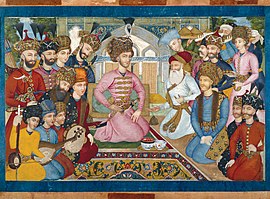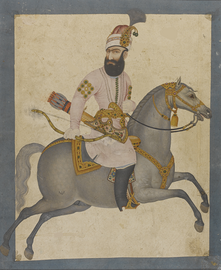|
Abu'l-Hasan Mostawfi Ghaffari
Abu'l-Hasan Mostawfi Ghaffari (Persian: ابوالحسن مستوفی غفاری) was an 18th-century Iranian painter and historian from the Ghaffari family of Kashan. Besides several European-style paintings, he is also known to be the author of the Golshan-e Morad, a book covering the history of the Zand dynasty.[1] BiographyThe Ghaffari family had a lengthy history of serving in government. Abu'l-Hasan's father Mirza Mo'ezz-al-din Mohammad Ghaffari was the governor of Kashan, Qom, Natanz and Jowshaqan during the reign of the Zand ruler Karim Khan Zand (r. 1751–1779). Abu'l-Hasan was born in Kashan in the late 18th-century.[1] He had two brothers named Abdul Matlab and Mirza Ahmad.[2] Since the late Safavid era, European-style paintings had been a favorite subject of Iranian artists, and Abu'l-Hasan was the first member of his family to show an interest in them. Abu'l-Hasan describes how he started painting;[1]
Abu'l-Hasan then made the decision to shift career paths. After learning the craft of annotation, he started writing official records and eventually rose to the position of court historian of Karim Khan. Due to internal strife amongst the Zand family following Karim Khan's death in 1779, Abu'l-Hasan appears to have stopped writing between 1780 and 1784. But after these problems subsided in 1784 under the rule of Ali-Morad Khan Zand (r. 1781–1785), he started writing again, naming his historical chronicle Golshan-e Morad after the new Zand ruler. Despite changing his career path to that of a chronicler and scribe, Abu'l-Hasan never stopped painting, as demonstrated by handwritten and date-stamped paintings.[1] Regarded as a skilled portrait artist, Abu'l-Hasan used "al-Mostawfi" as his signature.[3] Abu'l-Hasan died in c. 1797/98.[1][4] He was the great paternal uncle of Farrokh Khan and Abu'l-Hasan Sani al-Mulk.[2] Gallery
References
Sources
|
||||||||||||||


